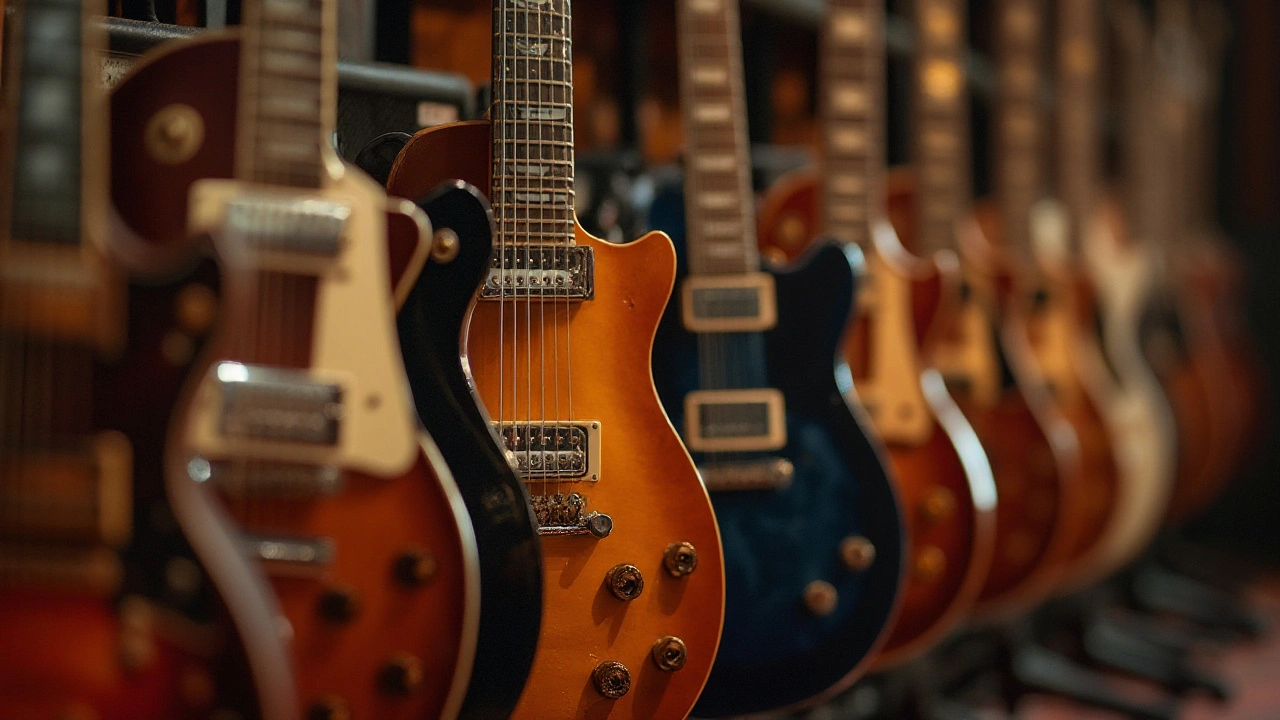Electric guitars have a magical aura about them, an irresistible charm that has enthralled musicians and audiences alike for decades. From thundering rock solos to soulful blues licks, these instruments have shaped the soundtracks of our lives. But what makes one electric guitar stand out from another, and how do you choose the right one for your personal style?
Join us as we journey through the electrifying world of guitars, uncovering the unique qualities of top favorites for every genre. You'll find helpful tips on what to look for when investing in a new guitar and how to keep it sounding its best through the years. Whether you're strumming your first chords or hitting the professional stage, this guide is your gateway to making an informed decision about your next electric companion.
- Understanding Electric Guitars
- Top Picks for Every Genre
- Buying Tips for New and Seasoned Players
- Maintaining Your Instrument
Understanding Electric Guitars
Electric guitars have played a pivotal role in shaping musical landscapes, becoming an integral part of music genres across the globe. Unlike their acoustic cousins, electric guitars rely on magnetic pickups to convert the vibration of strings into electrical signals, and this is where their iconic sound begins. This innovation, dating back to the 1930s, transformed how music was created and performed, giving birth to a multitude of styles and genres. From the rich tones of a vintage Les Paul to the distinct twang of a Fender Telecaster, each electric guitar offers a unique fingerprint of sound, ensuring that every musician can express their individual style.
To truly understand electric guitars, one must dig deeper into their anatomy. The body, neck, and headstock are fashioned from various woods such as maple, mahogany, and alder, each contributing to the instrument's tone. Moreover, the pickups—usually single-coil or humbucking—play an essential role in sound shaping. Single-coil pickups offer a brighter tone and a crisp clarity, often preferred by blues and country players. In contrast, humbuckers are known for their thicker, warmer sound, making them a favorite among rock and metal guitarists. There's an art to choosing the right setup; it involves considering not just tone but also playability and comfort, ensuring the guitar meets your personal preferences.
Famed for his profound influence on music, Jimi Hendrix once said,
"Technically, I'm not a guitar player; all I play is truth and emotion."This speaks volumes about the role of electric guitars in delivering the rawest form of musical expression. Additionally, the choice between solid-body and semi-hollow or hollow-body guitars can also affect sound and feel. Solid-body guitars resist feedback and are adaptable, making them ideal for high-gain environments. On the other hand, hollow-body guitars produce a resonant quality, favored in jazz and blues. It's fascinating how these instruments, though quite similar in construction, can deliver such a wide array of auditory experiences.
Let's not forget the importance of the amplifier—a critical component in the sound production of electric guitars. Amplifiers can dramatically alter your sound, offering endless possibilities to enhance your music. From tube amplifiers with their warm tones to digital models that provide a vast array of effects, the right choice of amp can be the difference between a good and a great performance. Pairing the right amp with your guitar can open up creative pathways you never knew existed.
To sum up this glimpse into the world of electric guitars, it's clear that understanding these instruments is about tapping into a wide array of factors that contribute to their distinctive quality. Each electric guitar offers a unique canvas for personal expression, enabling musicians to craft their signature sound. Whether it's the style of music, the feel of the neck, or the character of the pickups, every element plays a part in the grand tapestry of your musical journey.

Top Picks for Every Genre
In the vast universe of electric guitars, certain models have risen to legendary status, favored by musicians across genres for their unique sound qualities and playability. If you're diving into the world of rock, the iconic Gibson Les Paul is often the first stop. With its thick slab of mahogany and smooth, rich tones, it's no wonder guitar heroes from Jimmy Page to Slash have given life to its majestic roar on stage. Rock enthusiasts appreciate its ability to handle heavy distortion without losing clarity.
For those more inclined towards the chimey, brighter side of things, the Fender Stratocaster is your ticket to tone nirvana. Known for its contoured body and bell-like clarity, the Stratocaster is a frequent choice for blues maestros like Eric Clapton and Stevie Ray Vaughan. The versatility it offers with its three single-coil pickups allows musicians to explore a wide range of sounds from smooth blues to punchy punk.
Jazz players, who prefer warm, rounded tones, often gravitate toward the Gibson ES-335. This semi-hollow body guitar bridges the gap between the crispness of solid bodies and the resonance of hollow bodies. The likes of B.B. King and Chuck Berry have spun timeless tunes with the ES-335, making it an enduring choice for those seeking to blend elegance with boldness.
“The electric guitar has brought out orchestration in recordings that was barely touched in jazz before.” — Wes Montgomery
Venturing into the realm of alternative or indie music? The Rickenbacker 330 might pique your interest with its jangly sound that suits the reflective yet edgy vibe of the genre. Known for its distinct tone, this guitar has been famously wielded by The Byrds and The Smiths, adding a layer of character that cuts through the mix with clarity and definition.
Metalheads, on the other hand, find the B.C. Rich Warlock to be a companion worthy of the thunderous demands of their genre. Its aggressive design and high-output pickups allow for the heaviest tones to come alive, perfectly complementing the deep growls and machine-gun riffs required by metal music.
To help you make a well-informed decision, here's a simple comparison highlighting some key specs:
| Model | Type | Sound Character |
|---|---|---|
| Gibson Les Paul | Solid Body | Rich, Full-bodied |
| Fender Stratocaster | Solid Body | Bright, Versatile |
| Gibson ES-335 | Semi-Hollow | Warm, Resonant |
| Rickenbacker 330 | Semi-Hollow | Jangly, Defined |
| B.C. Rich Warlock | Solid Body | Aggressive, Metallic |
Choosing the right electric guitar isn't just a matter of sound; it's about finding an instrument that resonates with your musical journey. By considering these stellar options, you'll be equipped to make an informed choice, paving the way for countless riffs and soulful solos.

Buying Tips for New and Seasoned Players
Choosing an electric guitar can be quite the adventure, even if you've been playing for years. For beginners, the journey is filled with excitement and anticipation as they prepare to explore a whole new world of sounds. On the other hand, experienced players may find themselves searching for a specific tone or feel that aligns better with their progressing style. Regardless of your experience, some fundamental tips can guide anyone toward making a smart purchase.
First off, consider the genre of music you play most often. Different guitars complement different styles. For instance, a guitar with a solid body, like the legendary Fender Stratocaster, might suit rock or blues players due to its bright tones and versatility. Meanwhile, hollow body guitars, such as the Gibson ES-335, offer warm, resonant tones favored by jazz musicians. Understanding the tonal characteristics that fit your genre is key to narrowing down the choices.
Next, comfort is essential. Make sure to test guitars in person when possible. Feel the neck profile; some prefer a thicker neck, while others go for the slender, speedy feel of a thinner one. The weight of the guitar and the position of the controls are also crucial. A guitar that doesn't sit comfortably while you're playing can lead to poor performance and even physical strain over time. If you're investing in your first guitar, consider models with a reputation for ease of play, like the Yamaha Pacifica series, known for its comfortable fretboard and forgiving action.
Price is often a major factor, especially for newer players. Beginners don’t need to break the bank on their first or second guitar. There are numerous affordable models with great performance from brands like Squier and Ibanez. Always balance budget with quality. Seasoned players might be ready to invest more heavily, focusing on specific build materials, pickup configurations, or custom finishes that reflect their personal playing needs. Always remember that a higher price does not always equate to better suitability for your style or comfort.
A good rule of thumb is to consider the overall package the guitar offers, including its hardware, pickups, and even the manufacturer’s reputation. Trustworthy brands often offer long-lasting, reliable instruments. And while it might seem overwhelming, remember that it’s okay to seek advice. As guitar legend, Eddie Van Halen once said, "The guitar is a very personal and honest form of expression." Try demoing a range of guitars and listen to experienced staff or fellow musicians who can offer insights you might not have considered.
| Brand | Entry-Level | Pro Level |
|---|---|---|
| Fender | Squier Bullet Strat | American Professional II Stratocaster |
| Gibson | Epiphone Les Paul Standard | Les Paul Standard '60s |
| Ibanez | GRG121DX | Prestige RG652AHM |
Whether you’re a novice or a lifelong player, the right electric guitar can become a natural extension of your musical voice. So embrace the process, trust what feels right, and let your perfect guitar amplify your musical instruments journey to new heights.

Maintaining Your Instrument
Proper maintenance of your electric guitars is essential to preserving both their tone and longevity. An electric guitar isn't just a tool for making music; it's an extension of the musician’s soul. Regular care keeps it in top condition and can significantly extend its lifespan, ensuring it continues to deliver the sound and performance you prize. A critical aspect of maintenance involves the strings. Regularly changing and cleaning the strings can prevent rust and corrosion, which can negatively affect sound quality. Many guitarists, both experienced and novice, underestimate how much regular string maintenance contributes to the instrument's overall performance. For active players, a string change every month or so is advised, while weekend warriors might manage quarterly.
The body of your guitar deserves attention too. Dust and sweat can accumulate on the guitar's finish, potentially leading to scratches or other damage. Using a microfiber cloth is a simple way to keep the guitar’s body clean. Apply a mild cleaning solution specifically designed for guitars to maintain its shine without harming the finish. Paying special attention to the neck and fretboard is equally important. These areas can become sticky with regular play, impacting your ability to glide smoothly along the neck. Rubbing down the neck with a commercial neck cleaner helps protect it while ensuring a slick playing surface. Moreover, conditioning the fretboard periodically with lemon oil can keep it hydrated and less prone to cracking.
Electronics and Hardware Care
Another crucial element of guitar maintenance is the care of electronic components. Each electric guitar has a complex system of wires, pickups, and pots that might gather dust and grime over time. If the electronics get clogged or stop functioning smoothly, it might be time to spray a bit of contact cleaner into the pots and switches. This can drastically improve your guitar’s output and sustain. Nuts, output jacks, and strap pins also need periodic checks. Tighten these parts with a screwdriver when they become loose to avoid sudden detuning or other performance issues. An often overlooked piece of maintenance is the guitar’s action and setup. A poorly set-up guitar can be frustrating to play and can hinder even the most practiced hands. Consider having your guitar professionally set up every few years to ensure the neck’s truss rod, the bridge height, and the intonation are correctly adjusted. A correctly set-up guitar can be revealingly easier to play and will welcome the user with consistently better sound.Storage conditions play a pivotal role in maintaining your cherished musical instruments. It’s vital to store guitars in a humidity-controlled environment, preferably in their cases, especially if not in regular use. Extremes in temperature and humidity can warp the neck and body, leading to expensive and sometimes irreversible damage. A hygrometer for tracking humidity levels helps in maintaining a stable environment for your guitars. Additionally, using a humidifier in arid spaces or a dehumidifier in very wet conditions can prevent those pitfalls. Lastly, one of the best habits to form is regular inspection. Take some time every few weeks to give your guitar a thorough once-over. Look for any new scratches, rattling noises, or slight changes in the tone. This proactive approach can catch problems before they escalate, saving costs on repairs and ensuring you're always ready to rock with your electric guitars.






